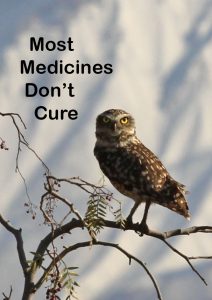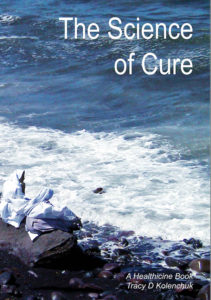 Most medicines make no claim to cure. Most medicines simply do not cure.
Most medicines make no claim to cure. Most medicines simply do not cure.
Does this surprise you? It’s a statement easily verified, even by a novice. Let’s look at some ways to test, and prove it.
First, walk over to you medicine cabinet. Take out each of the medicines. Read the label, look for the word ‘cure’. You might want to take to the internet, to look up the medicines in your cabinet – to search for the word cure. In most cabinets, you will not find a single medicine that claims to cure any illness.
If you do find a medicine that cures – they do exist, it will be an antibiotic, or an anti-fungal medicine. Is that all there is? Yes.
Next, walk over to your local drugstore – where medicines are sold. Try to find a medicine that cures an illness. Are there any medicines for sale OTC – Over the Counter, that claim to cure? Nope. Maybe cures are too dangerous to sell OTC? Maybe medicines that cure are only available by prescription?
If you take the time (I have done so) to check each and every one of the 100 best selling prescription medicines for any year, you will not find five that cure. Less than 5 percent of top selling medicines claim to cure. Those that do cure are, same same, antibiotics and anti-fungal medicines.
Maybe we need to look at alternative medicines? Some pharmacies also sell alternative health produces. You can check, but you won’t find any alternative product that claims to cure any disease. You can find many that can be used to ‘treat’ a disease. If you head over to the local alternative health store – it doesn’t get any better. There are very few medicines that claim to cure in the pharmacy and few, if any, medicines that claim to cure in health food stores as well.
Arguments and comparisons between conventional and alternative medicines can be reduced to this simple question:
Which medicine does not cure better?
They can’t cure. They only ‘not cure’. Most medicines treat symptoms, making no attempt to cure.
How can this be? Why does this happen? Perhaps we need to define cure. You can check a few dozen dictionaries without finding a useful definition of cure. Many recently published medical dictionaries simply DO NOT CONTAIN entries for cure, cured, cures, or even incurable. Cure has disappeared from modern medicine.
Of course everyone knows the meaning of cure, with or without a dictionary.
Cure (verb) to bring about the end of an illness.
Cure (noun) a substance or action that brings about the end of an illness.
When a disease is cured, it’s gone.
Most medicines treat diseases, but do not cure. Most medicines are marketed with the mantra “learn to live with your disease”, translation: you are going to die with your disease. There are no cures for most diseases. Most medicines do not cure.
Why does this happen? It happens because there are no diseases caused by a lack of medicines. On the other hand, there are many illnesses caused by an excess of medicines – euphemistically called ‘side effects’.
Does this mean lots of diseases are incurable? No.
Every illness can be cured. – the Healthicine Creed.
Even the common cold – commonly claimed to be incurable (because it cannot be cured by medicines) – is easily cured by healthiness. When you are healthier, your health cures the cold faster. When you are less healthy, it takes longer to cure a cold.
Every illness can be cured. But in most cases, the cure is not a medicine.
All diseases have causes. Chronic diseases have chronic causes. When a disease has a chronic cause – it can only be addressed, can only be cured, by addressing the chronic cause. If you have obesity because you eat too much unhealthy food, you won’t be cured by any medicine, you will only be cured when you eat less unhealthy food. If you have depression because your work is too stressful, or because your diet is unhealthy, no medicine can cure. You can only cure by addressing the cause.
Most medicines don’t cure.
Every illness can be cured.
to your health, tracy


